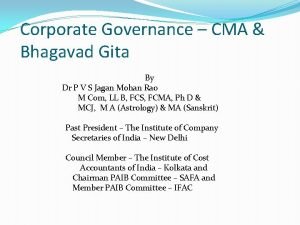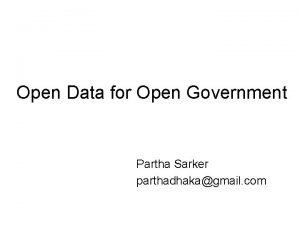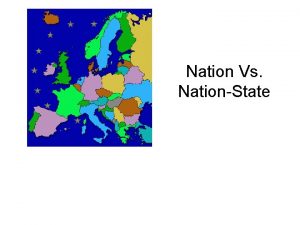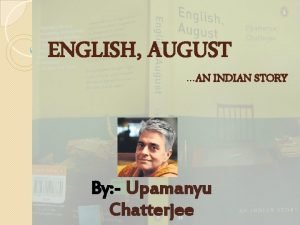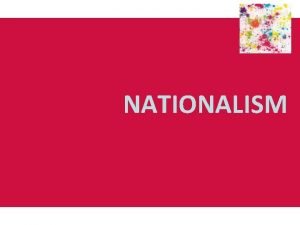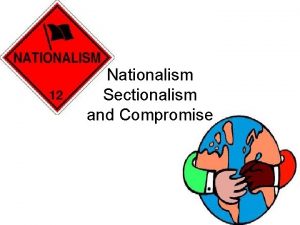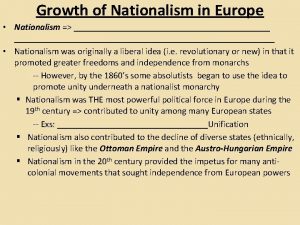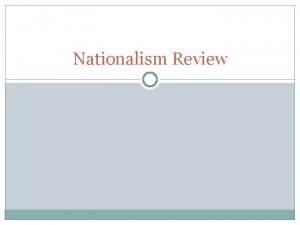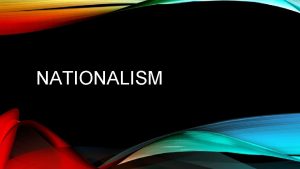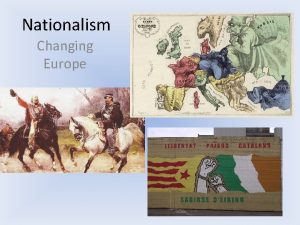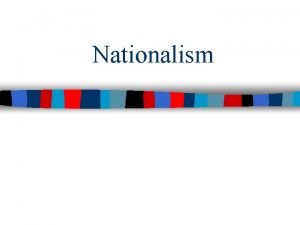Partha Chatterjee The Nation and its Women Nationalism












- Slides: 12

Partha Chatterjee “The Nation and its Women”

Nationalism and the women’s question • The ideological sieve through which European ideas of reform passed through • Emphasis on difference with the West • Women’s question situated in an inner domain of sovereignty, away from the political contest with the colonial state • Discovery of tradition (contra the civilising mission of colonial rule) • Women’s question taken out of the realm of negotiation with the colonial state

Saving brown women • For the colonialists, the degraded condition of Indian women came to stand in for the inferiority of the entire cultural tradition of India • The problem of tradition already constituted by the colonial state (ratified a minority, entrenched tradition as hegemonic)

A Woman Leaping into the Flames to the Corpse of her Husband, etching by Solvyng 1799.

Two spheres • Material sphere: science, technology; economics; statecraft. Okay to imitate the West in this domain • Spiritual sphere: east superior; national culture; women as nurturers of this realm • Superimposed on to concepts of outer and inner; social space of home and the world

Against westernization • Caricatures of the westernized Bengali women in literature and popular culture • Moral condemnation through parody • Critique of the new social elite emerging around the new institutions of colonial administration and trade

The new woman in a new patriarchy? • Neither westernized nor the oppressed object of indigenous patriarchy • The new middle class • Education for women—as against that introduced by Christian missionaries—became widespread (before British women were admitted to universities) • The virtues of (spiritual) freedom and self-emancipation, linked with national sovereignty • Inculcation of virtues—discipline, thrift, cleanliness, accounting • New forms of dressing/clothing • Refined tastes

Nationalist ideology • Fixing of masculine/feminine qualities; home and the world; material and spiritual spheres • Woman as goddess/mother (erasure of sexuality in the outside world) • Woman as sign of nation • Seeming absence of autonomous women’s movements • Feminist struggles waged in the home (not much evidence in the archives)—letters, art, cultural artefacts, literature • The nationalist discourse was about women; women did not speak

Women’s Voices • Emergence of a modern consciousness under conditions of colonial rule • The new individual inscribed in the narrative of the nation • Question of the “new woman” formulated as a a question of “coping with change”

Women’s autobiographies • Gendering the genre of the (male) autobiography: modern self-representation • “Sovereignty over language…is doubly vitiated for those who were subordinated, at one and the same time, to colonialism as well as to a nationalist patriarchy”. • Domestic concerns + social history of the times • memoirs

“I am only a bird in a cage” • Early 19 th c: Struggles over literacy—against religious and patriarchal scripts • Nationalism’s appropriation of women’s stories (Rassundari’s story; Saradasundari story as mother of a great reformer) • West appears in the form of a husband or son

The new women • Conjugal lives—separate residence from extended family, often in the city • Conjugal tutelage • Inner domain sovereign from the outer • The inner could not be spoken of in public (Prasannamayi) • A national script for the new woman • Binodini’s story, her betrayal—tells her story • (the exclusionary aspects of nationalism: caste, class, religion, sexuality)



